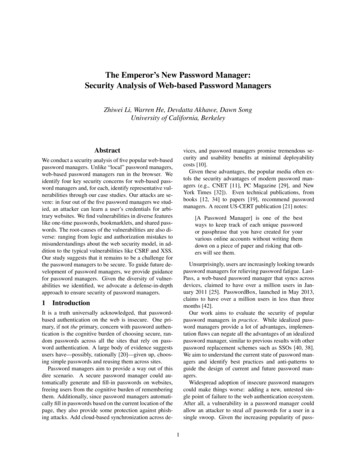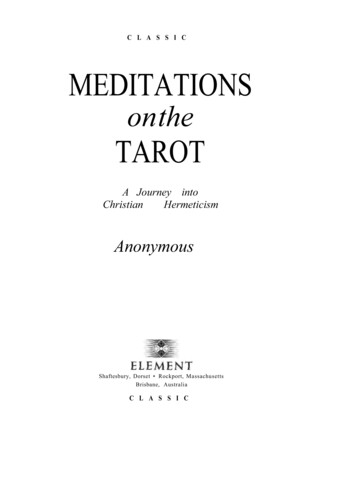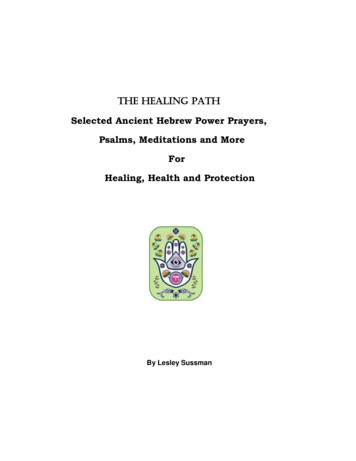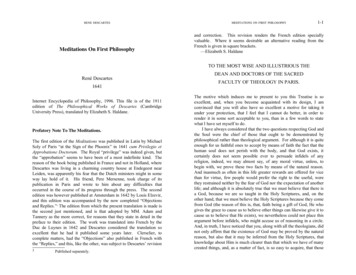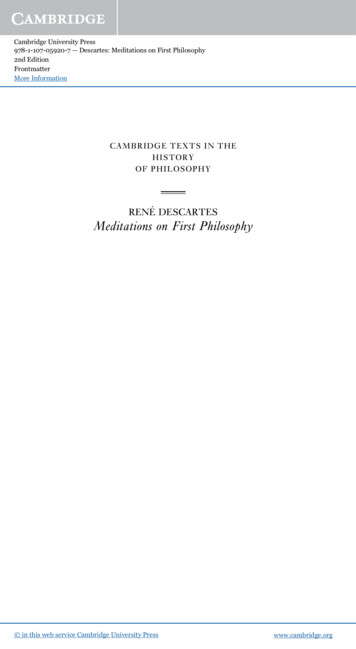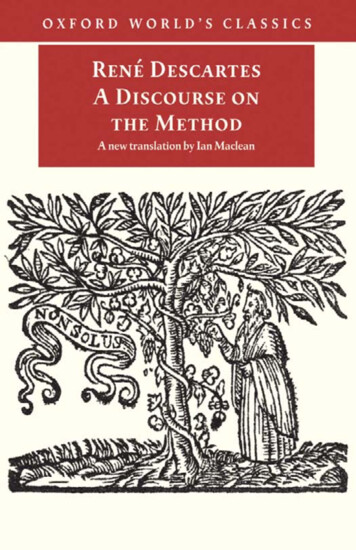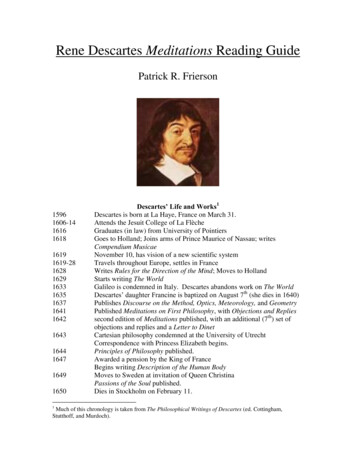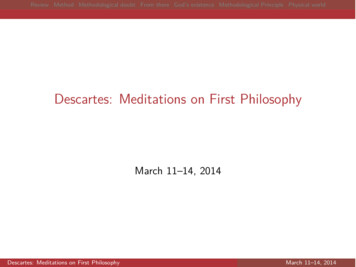
Transcription
the meditations of the emperormarcus aurelius antoninus
natural law andenlightenment classicsKnud HaakonssenGeneral Editor
Francis Hutcheson
uuuuuuuuuuuuuuuuuuuuuiiiiiiiinatural law andiienlightenment classicsiiiiiiiiiiiiiiiiiiiiiiiiiiiiiiiii Translated by Francis Hutcheson and James Moor ii Edited and with an Introduction by James Moore iiiand Michael SilverthorneiiiiThe Collected Works and Correspondenceiiiiof Francis Hutchesoniiiiiiiiiiliberty fundiiIndianapolisiiiiiiiiuuuuuuuuuuuuuuuuuuuuuThe Meditationsof the EmperorMarcus AureliusAntoninus
This book is published by Liberty Fund, Inc., a foundation establishedto encourage study of the ideal of a society of free and responsible individuals.The cuneiform inscription that serves as our logo and as the design motif forour endpapers is the earliest-known written appearance of the word“freedom” (amagi ), or “liberty.” It is taken from a clay document writtenabout 2300 b.c. in the Sumerian city-state of Lagash.Introduction, annotations, index 䉷 2008 by Liberty Fund, Inc.All rights reservedPrinted in the United States of Americac 1 2 3 4 5 6 7 8 9 10p 1 2 3 4 5 6 7 8 9 10Frontispiece: Detail of a portrait of Francis Hutcheson by Allan Ramsay(ca. 1740–45), oil on canvas. Reproduced courtesy of the Hunterian ArtGallery, University of Glasgow.Library of Congress Cataloging-in-Publication DataMarcus Aurelius, Emperor of Rome, 121–180.[Meditations. English]The meditations of the Emperor Marcus Aurelius Antoninus/translated by Francis Hutcheson and James Moor;edited and with an introduction by James Moore and Michael Silverthorne.p. cm.—(Natural law and enlightenment classics)(The collected works and correspondence of Francis Hutcheson)Includes bibliographical references and index.isbn 978-0-86597-510-1 (hardcover: alk. paper) isbn 978-0-86597-511-8 (pbk.: alk. paper)1. Ethics—Early works to 1800. 2. Conduct of life—Early works to 1800.I. Moore, James, 1934– II. Silverthorne, Michael. III. Title.b580.h88m3713 2008188—dc222007037857liberty fund, inc.8335 Allison Pointe Trail, Suite 300Indianapolis, Indiana 46250-1684
contentsIntroductionixA Note on the TextxxxiAcknowledgmentsxxxiiithe meditations of the emperormarcus aurelius antoninus1Endnotes165Bibliography193Index203
introductionOn May 31, 1742, Francis Hutcheson in Glasgow sent to Thomas Drennanin Belfast some copies of The Meditations of the Emperor Marcus AureliusAntoninus. Newly translated from the Greek: With Notes, and an Account ofhis Life (Glasgow: Printed by Robert Foulis and sold by him at the College:1742).1The letter that accompanied the dispatch of the books contained thefollowing intriguing account:The bearer Mr. Hay takes over some copies of a new translation of Antoninus, the greater half of which and more, was my amusement last summer, for the sake of a singular worthy soul one Foulis;2 but I don’t let myname appear in it, nor indeed have I told it to any here but the Man concerned. I hope that you’ll like it; the rest was done by a very ingenious Ladone Moore.3 Pray try your critical faculty in finding what parts I did &what he did. I did not translate books in a suite, but I one or two, & heone or two. I hope if you like it that it may sell pretty well with you aboutBelfast I am sure it is doing a publick good to diffuse the Sentiments &if you knew Foulis you would think he deserved all incouragement.41. The Meditations were reprinted in Glasgow by Robert and Andrew Foulis in 1749(2nd ed.), 1752 (3rd ed.), and 1764 (4th ed.). Another “4th ed.” was printed in Dublinfor Robert Main in 1752.2. Robert Foulis (1707–76) was appointed printer to the University of Glasgow in1743. In partnership with his brother Andrew, he was responsible for the publication ofmany attractive and accurate editions of classical texts.3. James Moor (1712–79) was appointed university librarian of the University of Glasgow in 1742 and professor of Greek in 1746. He edited many of the classical texts published by Robert and Andrew Foulis. Robert Foulis married Moor’s sister Elizabeth inSeptember 1742. Moor and the Foulis brothers witnessed Hutcheson’s will on June 30,1746.4. Letter of Francis Hutcheson to the Reverend Mr. Thomas Drennan in Belfast,Glasgow, May 31, 1742. MS: Glasgow University Library, MS Gen 1018 no. 11.ix
xintroductionHutcheson’s letter raises a number of questions: (1) Which books of TheMeditations contain Hutcheson’s translations and notes and which booksshould be attributed to Moor? (2) What considerations prompted Hutcheson to undertake this translation and edition, apart from his announceddesire to be of assistance to Robert Foulis and the Foulis press? (3) Whatmight be the significance of Hutcheson’s notes to the text? Do they makeup a coherent set of ideas concerning human nature, morals, politics, andreligion? And what may be the relevance of these notes for our understanding of his other writings? (4) Why was Hutcheson determined that hisname should not appear in the volume and that no one in Glasgow and itsenvirons apart from Foulis should know the identity of the persons responsible for the translation and the notes? (5) And, finally, what was thesignificance of Hutcheson’s adaptation of The Meditations for the Enlightenment in Scotland?1. Hutcheson and Moor:The Division of ResponsibilityThere is a prima facie problem concerning the respective contributions ofHutcheson and Moor to The Meditations. There are three pieces of externalevidence, and they do not agree. The first is Hutcheson’s letter to Drennan,with his claim that he had done “the greater half . . . and more”; a claimcomplicated by the circumstance that Hutcheson originally wrote “the firsthalf and more” and then struck through “first” and substituted “greater.”Clearly Hutcheson was reluctant to be specific and preferred to make agame of it with Drennan. The second bit of evidence is found in The FoulisCatalogue of Books (Glasgow, 1777), where it is reported that the first twobooks were by James Moor and the remainder by Hutcheson.5 This recordof the matter has been accepted by many later scholars.6 It has the meritof consistency with Hutcheson’s claim that he had done “one or twobooks,” and Moor, “one or two”; and it leaves Hutcheson with responsi-5. Duncan, Notices and Documents, 49.6. Scott, Francis Hutcheson, 144; Hutcheson, On Human Nature, 176.
introductionxibility for the “greater half,” although not for the “first” half, as he had originally written.There is another account of the matter. Thomas Reid entered the following note in his own copy of the 1764 edition of The Meditations: “Dr.Moor translated the 9th and 10th books. Dr. Francis Hutcheson the rest.Dr. Hutcheson wrote the Preface and Dr. Moor collected [sic! ] the Proofs.This information I had from Dr. Moor.”7 We believe that Reid’s note is themost authoritative of the three versions of this matter. Books IX and Xdiffer from the other books. The style of the translation of books IX andX lacks the characteristic flow of Hutcheson’s prose. These two books alsocontain a number of phrases not found elsewhere in the text. “Nature” or“the nature of the whole” is referred to as “she” (for example, bk. IX, art. 1,pp. 107–8)—the Greek phusis is a feminine noun—whereas elsewhere inThe Meditations nature is referred to as “it.”In the notes for books IX and X there are a number of references to Greekterminology and to Thomas Gataker’s translation of The Meditations fromthe Greek into Latin. A preoccupation with the original Greek of Marcusand with the quality of the translation by Gataker is not a conspicuousfeature of the notes found in the other books. It is a concern, however, thatmight be expected of someone like Moor, who was renowned for the accuracy of his command of ancient Greek. In every one of the other booksthere are extensive notes that expand upon and interpret the philosophy ofthe Stoics, with the exception of the first book, which is concerned notwith ideas but with individuals who influenced Marcus (many of themStoics). The term Stoic is never used in books IX and X. Finally, in booksIX and X, there is an abundance of citations to writers of the New Testament: fourteen in all; twice as many as are found in the notes to all of theother books combined. In light of these considerations, we conclude thatReid’s record of his conversation with Moor may be taken as the mostauthoritative of the three pieces of external evidence: books IX and X byMoor; the rest by Hutcheson.7. Bodleian Library, Oxford, Vet A4 f. 505 (9). See Stephen, “Francis Hutcheson andthe Early History of the Foulis Press,” 213–14. The editors are grateful to Dr. DanielCarey for bringing this item to their attention.
xiiintroduction2. The Glasgow Edition in Context:Other Editions and InfluencesWhat prompted Hutcheson and Moor to undertake this translation andedition of The Meditations? One of their expressed motivations was stylistic. They were dissatisfied with the two translations then available in English. One was the translation by Meric Casaubon (1599–1671) publishedin 1634,8 described by Hutcheson as “the old English translation”: it “canscarce be agreeable to any reader; because of the intricate and antiquatedstile” (“Life of the Emperor,” p. 3). The other translation, published in1701 (and reissued in 1714 and 1726), was by Jeremy Collier (1650–1726), anonjuring Anglican clergyman best known for his attack on the Englishstage.9 This edition was described by Hutcheson as an exercise that “seemsnot to preserve the grand simplicity of the original.” Hutcheson tells usthat his translation is “almost intirely new” and has been made “accordingto Gataker’s edition of the original, and his Latin version” (“Life of theEmperor,” p. 4). Thomas Gataker (1574–1654) was an Anglican clergymanwith Puritan sympathies, who maintained good relations with Presbyterians and was a member of the Westminster Assembly. Gataker’s edition ofThe Meditations 10 in Greek, with a translation and commentary on the textin Latin, has been described by a modern classical scholar as “a monumentof vast and fastidious erudition,” which “has long been and will alwaysremain, the principal authority for any one undertaking to study or editthe Meditations.” 11 An enlarged version was published in London in 1697,12with a dedication by George Stanhope (1660–1728) to Lord John Somersand a translation into Latin by Stanhope of a life of Marcus Aurelius, composed in French, by André Dacier (1652–1722).It is this 1697 edition of The Meditations that Hutcheson and Moor usedas the basis for their edition. Hutcheson informs the reader that the “shortabstract” of the life of the emperor prefaced to his edition is “taken from8. Marcus Aurelius Antoninus the Roman Emperor, His Meditations ConcerningHimselfe.9. The Emperor Marcus Antoninus His Conversation with Himself.10. Markou Antoninou tou Autokratoros tōn eis heauton biblia 12 (1652).11. The Meditations of the Emperor Marcus Antoninus, ed. Farquharson, xlvi, xlix.12. Markou Antoninou tou Autokratoros tōn eis heauton biblia 12 (1697).
introductionxiiithe collections made by Dacier and Stanhope.” The “Maxims of the Stoics,” appended to the Hutcheson and Moor edition, was excerpted fromGataker’s “Praeloquium”:13 it had been included in the 1697 edition and,in English translation, in the 1701 edition. An abbreviated version of the1697 edition was published in Oxford in 1704, with emendations by R. I.Oxoniensis (thought to be Richard Ibbetson).14 This edition, with theGreek text and Latin translation by Gataker on facing pages, was republished by Robert and Andrew Foulis, in Glasgow, in 1744.15 It was one ofa dozen classical texts, published by the Foulis Press, that Hutcheson donated to the University of St. Andrews in 1746.16While Moor’s particular talent was his mastery of ancient Greek, Hutcheson was also sensitive to the challenge of translating the technical Stoicvocabulary employed in The Meditations: such terms as hegemonikon (“ruling principle”) and hypexairesis (“reserve clause”) were part of this vocabulary.17 Hutcheson called attention to the difficulty of finding Englishwords that would convey the meaning of these terms. He translated hegemonikon as “the governing part,” and in a note to bk. IV, art. I, p. 47, hewrote of the term hypexairesis: “The word here translated reservation, is anoted one among the Stoics, often used in Epictetus, Arrian, and Simplicius.” As Hutcheson explained it, the governing part of the mind may exercise a reservation upon desires for external things and then redirect themind to the pursuit of “our sole good,” which “is in our own affections,purposes, and actions.”It will also be evident that the language of Hutcheson’s translation remains very much his own. A. S. L. Farquharson, the editor of The Medi-13. In Jeremy Collier’s English translation (1726 ed., pp. 1–30) the title of Gataker’s“Praeloquium” reads: “Gataker’s Preliminary Discourse, In which the Principles of theStoics are compared with the Peripateticks, with the Old Academicks, and more especially, the Epicurean Sect: The remaining Writings likewise of the Stoick Philosophers,Seneca, Epictetus, and particularly those of our Emperour Marcus Antoninus, are brieflyexamined.”14. Markou Antoninou tou Autokratoros tōn eis heauton biblia 12 (1704).15. Markou Antoninou tou Autokratoros tōn eis heauton biblia 12 (1744).16. See Moore and Silverthorne, “Hutcheson’s LLD,” 10–12.17. Hadot, The Inner Citadel, 52, discusses the significance of these technical termsin the vocabulary of the Stoics.
xivintroductiontations,18 renders the first sentence of bk. II, art. 1, as follows: “I shall meettoday inquisitive, ungrateful, violent, treacherous, envious, uncharitablemen.”19 Hutcheson translates the same sentence in his own idiom: “to dayI may have to do with some intermeddler in other mens affairs, with anungrateful man; an insolent, or a crafty, or an envious, or an unsociableselfish man” (p. 33).As Hutcheson presents The Meditations, Marcus’s reflections are designed to directly affect the sensibility of the reader and excite a desire tocontribute to the happiness of others. Marcus’s soliloquies, he tells us,“contain some of the plainest, and yet most striking considerations, to affect the hearts of those who have any sense of goodness”; they cannot failto inspire in us “a constant inflexible charity, and good-will and compassiontoward our fellows, superior to all the force of anger or envy, or our littleinterfering worldly interests” (p. 3). Marcus’s language, in short, posed noobstacle to Hutcheson’s discovering in The Meditations a moral philosophyvery much congenial to and in harmony with his own. His reading of TheMeditations may also have been influenced by the recognition that moralistswhom he very much admired had discovered in the reflections of MarcusAurelius insights of great relevance for themselves.Shaftesbury declared that he had discovered the proper meaning of sensus communis, as that phrase had been used by Roman moralists and satirists, in the notes and commentaries on The Meditations by Meric Casaubon and Thomas Gataker.20 It was in the glosses of those commentatorson the term translated by Hutcheson as “an unsociable, selfish man” thatShaftesbury recognized that sensus communis had been used by Juvenal,Horace, and Seneca “to signify sense of public weal and of the commoninterest, love of the community or society, natural affection, humanity,obligingness, or that sort of civility which rises from a just sense of thecommon rights of mankind, and the natural equality there is among thoseof the same species.”21 In the same essay, Shaftesbury went on to account18. See n11, above.19. The Meditations of the Emperor Marcus Antoninus, ed. Farquharson, vol. 1, p. 21.20. Shaftesbury, “Sensus Communis, an Essay on the Freedom of Wit and Humour,”in Characteristics of Men, Manners, Opinions, Times, 48–49, n19.21. Ibid., 48.
introductionxvfor the origin of families, societies, clans, and tribes in a manner similar toMarcus (bk. IX, art. 9, pp. 109–10). Shaftesbury did not draw the conclusion formed by Marcus, however, that there is a universal happiness or goodthat all mankind may share. Instead, he thought that “Universal good, orthe interest of the world in general, is a kind of remote philosophical object.That greater community falls not easily under the eye.”22 In this respect,Hutcheson’s concern for “universal happiness” has more in common, aswe shall see, with Marcus and with Stoic ideals. Shaftesbury elsewhere considered Marcus “one of the wisest and most serious of ancient authors.”23And he cited sayings of Marcus, together with excerpts from the works ofEpictetus and Horace, to urge readers to withdraw their admiration anddesire from objects that are merely pleasurable and direct them instead to“objects, whatever they are, of inward worth and beauty (such as honesty,faith, integrity, friendship, honour).”24Another moralist whom Hutcheson held in high regard, Henry More,cited sayings of Marcus repeatedly throughout his handbook of morals,Enchiridion ethicum.25 More was particularly impressed by Marcus’s concept of the rational soul, of the idea that there is a divinity within us: “thatevery Man’s Mind is a God, and had its Original from him”;26 that “in theJudgment of that wisest Philosopher . . . to acquiesce in Nature’s commonLaw, is . . . to obey the common Reason, that is in God; nay, which is littleless than God himself. For he is the living Law”;27 “that it was highly estimable to live benignly, and to practise Truth and Justice.”28 More, it maybe added, was attempting in these citations to reconcile Stoic and neoPlatonic ideas concerning virtue with a reading of Aristotle’s ethics in whichRight Reason was ultimately nothing more than the promptings of an “Inward Sense.”2922. Ibid., 52.23. Shaftesbury, “Soliloquy, or Advice to an Author,” in Characteristics, 113.24. Shaftesbury, “Miscellany IV, Chapter I,” in Characteristics, 423.25. More’s Enchiridion ethicum (1667) was translated in 1690 as An Account of Virtue:or, Dr. Henry More’s Abridgment of Morals.26. More, An Account of Virtue, II.5.VII, p. 120.27. Ibid., I.2.VII, p. 95.28. Ibid., II.8.XVI, p. 143.29. Ibid., I.3.VII, p. 17.
xviintroductionHutcheson’s earliest reference to the work of Marcus Aurelius appearsin An Essay on the Nature and Conduct of the Passions and Affections withIllustrations on the Moral Sense (1728) in the course of a response to JohnClarke of Hull, who had argued, after Locke, that desire arises from theneed to relieve uneasiness of some kind. Hutcheson replied: “the noblestDesire in our Nature, that of universal Happiness, is generally calm, andwholly free from any confused uneasy Sensation: except, in some warmTempers, who, by a lively Imagination and frequent Attention to generalIdeas, raise something of Passion even toward universal Nature. . . . SeeMarcus Aurelius, in many places.”30A similar appeal to the reader to enlarge the scope of our desires wasmade in A System of Moral Philosophy (1755, but composed in the 1730s),in which Hutcheson explains the diversity of moral judgments by the tendency to confine moral approval to one’s own countrymen or, worse, tomembers of one’s own party or sect or cabal. He proposes that “we enlargeour views with truth and justice, and observe the structure of the humansoul, pretty much the same in all nations; . . . we must find a sacred tye ofnature binding us even to foreigners, and a sense of that justice, mercy andgood-will which is due to all. . . . See this often inculcated in Marc.Antonin.”31Again, in A System of Moral Philosophy, Hutcheson drew upon the workof Marcus to explain the meaning of true piety, as he understood it. Truepiety was not to be found in the asceticism of the early Christians nor inthe perpetuation of their “melancholy notions of sanctity” in the absurdprovisions of the canon law: “piety is never more sincere and lively thanwhen it engages men in all social and kind offices to others, out of a senseof duty to God: and just philosophy, as well as religion, could teach thattrue devotion, tranquility, resignation, and recollection too, may be practiced even in a court or camp, as well as in a wilderness. . . . See Marc Antonin in a variety of passages.”32 In this connection it may be recalled that30. An Essay on the Nature and Conduct of the Passions and Affections, sec. 2, art. 5,p. 44 (1728 ed.) or p. 40 (2002 ed.).31. A System of Moral Philosophy, I.5.VII, vol. I, pp. 93–94.32. Ibid., III.1.XII, vol. II, p. 182.
introductionxviiHutcheson was also diffident about revealing his authorship of the System;it was circulated only privately in his lifetime.3. The Significance of the AnnotationsHow should we understand the significance of Hutcheson’s notes to thetext? Hutcheson’s notes typically provide short explanatory discourses orexegeses of the ideas of the Stoics. It is remarkable that the same notes alsoilluminate Hutcheson’s own moral philosophy. This will become evidentas we consider his treatment in The Meditations of Stoic theories of humannature, the rational soul, the law, the citizen, God, and divine providence.A central theme of Hutcheson’s moral philosophy, from the earliest tothe last of his publications, had been that human nature is so constitutedthat mankind is naturally sociable. This theme was the subject of his inaugural lecture following his appointment as Professor of Moral Philosophy at the University of Glasgow.33 It was also the professed position ofthe Stoics, or so Hutcheson reminds the reader of The Meditations: “TheStoics always maintained, that by the very constitution of our nature, allmen are recommended to the affectionate good-will of all: which wouldalways appear, were it not for the interfering of falsely imagined interests”(bk. III, art. 5, p. 42, note). In a passage of the text where Marcus writesof “the peculiar structure and furniture of human nature,” Hutchesonnotes: “This, as it was often mentioned already, is such as both recommendsto us all pious veneration and submission to God, and all social affections;and makes such dispositions our chief satisfaction and happiness” (bk. XI,art. 5, p. 134, note).Hutcheson had maintained, in his inaugural lecture and elsewhere in hiswritings, that it is the presence of kind affections, a natural desire to performgood offices for others, public spirit—benevolence, in a word—that disposes us to be naturally sociable. He was at pains to remind readers, in AnEssay and in A System of Moral Philosophy, that the Stoics, “the avowedenemies of the passions,” had made provision for the passions and affec-33. “On the Natural Sociability of Mankind,” in Logic, Metaphysics, and the NaturalSociability of Mankind.
xviiiintroductiontions, for desire and aversion, joy and sorrow.34 But the Stoics had alsorecognized that the lower passions, the appetites of the body, desires forexternal things, must be subordinated to the more noble desires, the kindaffections, etc.35 Hutcheson found a similar ordering of the passions andaffections in the thought of Marcus Aurelius. Marcus had reminded himself not to be misled by the passions: “suffer not that noble part to be enslaved, or moved about by unsociable passions, without its own approbation” (bk. II, art. 2, p. 34).Hutcheson noted that Marcus was employing “a metaphor from puppets, mov’d by others. Such are men when led by their passions againstwhat their higher faculties incline to and recommend.” Marcus invoked thepuppet metaphor later in the text (bk. X, art. 38, p. 132; bk. XII, art. 19,p. 148). The “noble part” that must direct the passions and not be enslavedby them was, in Marcus’s mind, the intellect, the spark of divinity withinus, the rational soul. “Won’t you, at last, perceive, that you have somethingmore excellent and divine within you, than that which raises the severalpassions, and moves you, as the wires do a puppet, without your own approbation? What now is my intellectual part? Is it fear? Is it suspicion? Is itlust? Is it any such thing?” (bk. XII, art. 19, p. 148).The intellect or the soul was “the governing part,” the hegemonikon.Hutcheson, too, recognized that there was a governing part in human nature, which he called diversely the moral faculty or conscience but mostoften the moral sense. Hutcheson discovered this “governing part” in “theheart.” And he understood “the heart” to be the moral and spiritual equivalent of “the rational soul.”Hutcheson had been critical in his earlier writings, notably in Illustrations on the Moral Sense, of contemporary rationalists who attempted todiscover moral good and evil in the relations of things (Clarke), in truth(Wollaston), or in a notion of absolute and infinite perfection (Burnet,Balguy). These efforts were misdirected; they failed to focus upon the onlyquality in human nature that could properly be considered good: benev-34. An Essay (1728), sec. III, pp. 58–59, or pp. 49–50 (2002); A System I.1.V, vol. I,p. 8.35. A System I.4.VI, vol. I, p. 61.
introductionxixolence or kind affection.36 There were other rationalists who recognized thefundamental importance of benevolence and sociability in the generalscheme of things (Cumberland, Pufendorf ), but the reasoning required bythese “metaphysicians” was beyond the abilities of many who were undoubtedly virtuous or capable of virtue and goodness.37The Stoic conception of reason and the rational soul was not subject tothose objections: it was a faculty capable of immediate perception of virtueand vice, moral good and evil. Hutcheson provided the following note toa reference by Marcus to “that divinity which is within us”: “Thus the Stoicscall the rational soul, the seat of knowledge and virtue: deeming it a partof the divinity, ever pervaded, attracted, and inspired by it to all moral good,when the lower passions are restrained” (bk. II, art. 13, p. 37, note). Therational soul was conceived by “the Stoics, after Plato . . . to be a being orsubstance distinct both from the gross body, and the animal soul, in whichare the sensations, lower appetites and passions” (bk. V, art. 19, p. 65, note).This article and note are cited elsewhere (e.g., at bk. VII, art. 28, p. 87,and bk. VII, art. 55, p. 90). The rational soul so conceived was the facultythat distinguished virtue and vice, perceived moral good and evil: considered in this light, “the rational soul” was synonymous with “the heart”:“they [the Stoics], and the Platonists too, . . . endeavoured to make virtueeligible, from the very feelings of the heart, . . .” (bk. VI, art. 24, pp. 75–76, the daggered note). Also, “the most important practical truths are foundout by attending to the inward calm sentiments or feelings of the heart:And this constitution of heart or soul is certainly the work of God, whocreated and still pervades all things; . . .” (bk. XI, art. 12, p. 137, the doubledaggered note).Now the Stoics, Marcus Aurelius among them, maintained that there isa law of nature and that this law is known by reason, the intellect, therational soul. Hutcheson had maintained, in the Inquiry and elsewhere,that the perception of moral distinctions, of virtue and vice, of rights ofvarious kinds, did not depend upon a law.38 But in a note on The Medi36. Illustrations on the Moral Sense, secs. I, II, III.37. Hutcheson, Inquiry into the Original of Our Ideas of Beauty and Virtue (1725; 2004ed.), sec. I, art. IV, p. 94.38. Inquiry, sec. VII, pp. 176ff. (2004 ed.).
xxintroductiontations, Hutcheson acknowledged that human beings are governed by a lawof nature: “all intelligent beings are, by their nature, under the same immutable eternal law of promoting the good and perfection of the whole.This, in the supreme Being, flows essentially from his nature: in createdbeings, it is a gift from him” (bk. VIII, art. 2, p. 95, note). Moor, too, inhis notes on books IX and X refers to the “law of our nature; entire resignation to the will of God in all events, and kind affections to our fellows”(bk. IX, art. 10, p. 110, the double-daggered note); and, at bk. X, art. 13,p. 125, note, Moor refers to the “grand law of promoting the perfection ofthe whole, obedience to which is the supreme happiness.” In Hutcheson’smind, how we come to know the law of nature is not problematic: it isquite simply “the law of God written in the heart.”It may be remembered here once for all, the life according to nature, inAntoninus, is taken in a very high sense: ’Tis living up to that standard ofpurity and perfection, which every good man feels in his own breast: ’Tisconforming our selves to the law of God written in the heart: ’Tis endeavouring a compleat victory over the passions, and a total conformityto the image of God. A man must read Antoninus with little attention,who confounds this with the natural man’s life, condemned by St. Paul.(bk. VII, art. 56, p. 91, note)The law of nature is the law of God; indeed, according to Marcus, thelaw is God. In bk. X, art. 25, p. 127, he wrote of “these things which areordered by him who governs all: Who is the law, appointing to every onewhat is proper for him.” Moor noted that “this passage clears up manyothers where the same word occurs obscurely. See, [bk.] VII. [art.] 31.” Healso referred the reader to “the book de Mundo, which goes under Aristotle’s name; chap. 6. ‘For our law, exactly impartial to all, is God.’ ” Hutcheson agreed (bk. XI, art. 1, p. 133, note; bk. XII, art. 1, p. 144, note). ButHutcheson had earlier observed that God is also present in every humanbeing: “such is the divine goodness that he is ever ready to communicatehis goodness and mercy, in the renovation of the heart, and in forming init all holy affections, and just apprehensions of himself, to all minds whichby earnest desires are seeking after him” (bk. VIII, art. 54, p. 105, note).Hutcheson was employing the scholastic language of the co
This book is published by Liberty Fund, Inc., a foundationestablished to encourage study of the ideal of a society of free and responsible individuals. The cuneiform inscription that serves as our logo and as the design motif for our endpapers is the earliest-knownwritten appearanceof

